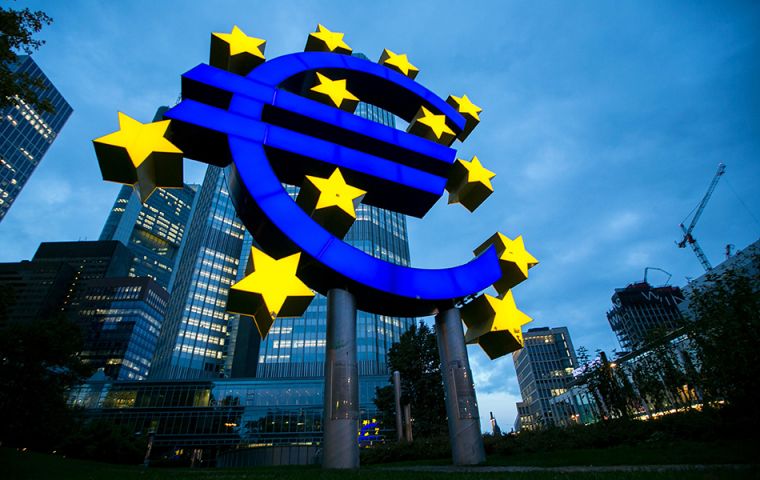MercoPress. South Atlantic News Agency
Euro zone interest rates frozen for twelve months given overall slowdown
 The unexpected moves came as the bank made sharp cuts to its forecasts for both growth and inflation this year.
The unexpected moves came as the bank made sharp cuts to its forecasts for both growth and inflation this year. Interest rates in the Euro zone will not rise until next year at the earliest, the European Central Bank has signaled amid evidence of a slowdown in the 19 countries using the single currency. The ECB also unveiled a round of fresh stimulus, offering banks cheap loans to try to help revive the economy.
The unexpected moves came as the bank made sharp cuts to its forecasts for both growth and inflation this year. The announcement sent the euro down by 0.6% against the dollar. Against the pound, it dropped by 0.1%.
The central bank said rates would remain at their present levels “at least through the end of 2019” rather than its previous guidance of “at least through the summer”.
Mario Draghi, president of the ECB, said economic data showed a “sizeable moderation” in growth.
He said economic growth in the euro area was now expected to be 1.1% this year, as against a previous forecast of 1.7%. Inflation is expected to be 1.2%, down from an earlier forecast of 1.6%.
“We are [in] a period of continued weakness and pervasive uncertainty. The near-term growth outlook will be weaker than previously anticipated,” Mr Draghi said.
The extent of the measures announced by the ECB underline its concerns over slowing growth in the Euro zone. Its decision to push back on any plans to raise rates follows similar moves from central banks around the world, including the US Federal Reserve and the Bank of England.
As well as a slowdown in the Euro zone - Italy tipped into recession at the end of last year - Mr Draghi also pointed to the impact of trade wars and other factors.
“The risks surrounding the euro area growth outlook are still tilted to the downside, on account of the persistence of uncertainties related to geopolitical factors, the threat of protectionism and vulnerabilities in the emerging markets,” Mr Draghi said.
The new lending facility for the banking sector will be known as Targeted Longer-Term Refinancing Operations.
Andrew Kenningham, chief Europe economist at Capital Economics, said the guidance on the next rate rise and the financing for banks was “more accommodative than the markets had anticipated”.
“We doubt, however, that the new measures will be enough to reverse the economic slowdown,” he said.




Top Comments
Disclaimer & comment rulesCommenting for this story is now closed.
If you have a Facebook account, become a fan and comment on our Facebook Page!